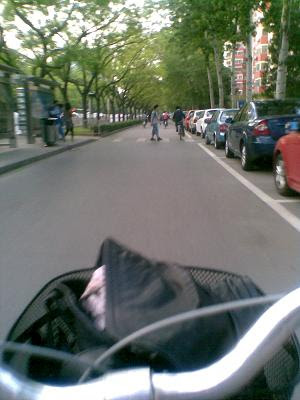But besides a mischievous desire to confound acquaintances, this convoluted description couldn’t be a more accurate reflection of the cultures I find myself having to cross into and back out again many times in the course of a day. Having lived and worked in several countries, different cultures do not faze me very much anymore, or so I’d thought. In my naïve assumption, I’d thought that since I speak and read the Chinese language and had survived working in Thailand with a grasp of Thai just enough not to get lost by, China will be a walk in the park.

Then I found it was indeed a walk in the park, albeit one taken by a law-abiding Singaporean, in a Japanese garden, the walls of which held off a very raucous Chinese world.
Let me explain. I have worked at length at two news bureaus and freelanced for several others. Most feature loud (sometimes screaming) news editors and equally strung-out journalists who are not beyond chattering to themselves in some nervous soliloquy when deadlines loom. But my first day at the bureau went by without hearing many more than ten words exchanged between colleagues. I attributed it to first day unfamiliarity.

But after a week of calm quiet in an office where conversations were as rare as finding good yakitori in Beijing, it soon became clear to me that a Japanese newsroom is quite unlike any others I’ve worked in. The mood inside is more akin to those hills of serene bamboo forests I once had the pleasure of walking up an autumn afternoon in Kyoto – solitary, aloof and yet filled with the promise of enlightenment at the end of the climb. Now if I could only pick up enough Japanese to converse with that sensei I’m sure is waiting cross-legged at the top, I have no doubt I too could feel part of this Zen-like state.

As if in contrast to the serenity inside, outside the bureau is the downtown heart of the Chinese capital, where a cacophony of lawless cars threaten to plow into pedestrians on green ‘walk’ signs, and bicycles and electric bikes swerve to avoid people, cars and each other while simultaneously going in all four directions. AND, I kid you not, spitting camels on the sidewalks. No, I’m lying. About the camels, I mean, not the spit. It will help give a clearer idea of my discomfit at this favorite Chinese pastime to explain that in Singapore, we have fines for dirtying our clean, green city with sputum, and signs everywhere reminding us of that should we have the sudden urge to clear out our respiratory tracts.

So you can imagine my chagrin when happily cycling to work one morning in the designated bicycle lane (which I should mention also doubles up in Beijing as a second pedestrian walkway and a lane for expensive German cars wishing to overtake the routine choked traffic), a man strolling along the sidewalk ahead loudly cleared his throat and spit into the bicycle lane. And as it goes on unfortunate mornings like this, I rode straight into this flying torpedo.
I shall cut this non-too appetizing narration short by just saying that I valiantly rode on as any journalist on a mission to get into the office would. This was post-Olympics after all and the courtesy campaigns that hounded people to queue up and not spit have all but disappeared. And I must say it’s a relief, spit in my hair or not. If I wanted organized predictability and being slapped with fines, I guess I could always pay home sweet home a visit.
4MNCGEX2QSD5
























































